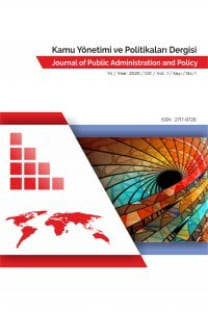THE INFLUENCE OF CONFUCIANISM FOR PUBLIC ADMINISTRATION IN FAR EAST
Konfüçyüsçülük, Kamu Yönetimi, Konfüçyüsçü Öğretiler, Yönetişim, Çin.
THE INFLUENCE OF CONFUCIANISM FOR PUBLIC ADMİNİSTRATİON IN EAST ASIA
: Confucianism, Public Administration, Confucian Teachings, Governance, China.,
___
- Adler, J. A. (2011). Confucianism in China Today. Pearson Living Religions Forum New York. Kenyon College.
- Assadullayev, E. (2018). BUREAUCRATIC TRADITION OF CHINA: CONFUCIANISM AND LEGALISM. Medeniyet Araştırmaları Dergisi, 6.
- Backover, M. I. (2010). Confucianism and Ethics in the Western Philosophical Tradition I: Foundational Concepts. Philosophy Compass, 5(4), 307-316. doi:10.1111/j.1747-9991.2010.00295.x
- Chuang, S., & Wang, G. G. (2018). Confucian philosophy and influence on perceived values and behavioural orientations by Taiwan’s millennials. Human Resource Development International, 21(4), 362-381. doi:10.1080/13678868.2018.1433393
- Creel, H. G. (1929). Confucius and Confucianism. The Open Court.
- Drechsler, W. (2015). Paradigms of non-Western Public Administration and Governance. In A. Massey, & K. Johnston (Eds.), The International Handbook of Public Administration and Governance. Cheltenham, UK ; Northampton, MA, USA: Edward Elgar Publishing.
- Drechsler, W. (2018). Beyond the Western Paradigm: Confucian Public Administration. In S. Bice, A. Poole, & H. Sullivan (Eds.), Public Policy in the 'Asian Century'. International Series on Public Policy. London: Palgrave Macmillan.
- Eno, R. (2015). The analects of Confucius. An Online Teaching Translation. Retrieved Nisan 10, 2022, from http://www.indiana.edu/~p374/Analects_of_Confucius_(Eno-2015).pdf
- Hague, R., Harrop, M., & Breslin, S. (1992). Comparative government and politics. Hong Kong: Macmillan.
- Hofstede, G., & Bond, M. H. (1988). Confucius and economic growth: New trends in culture’s consequences. Organizational Dynamics, 16(4), 4-21.
- Huanyin, Y. (1993). CONFUCIUS (K’UNG TZU) (551-479 BC). Prospects: the quarterly review of comparative education, XXIII(1/2), 211-19.
- Knoblock, J. (1988). Xunzi: A Study and Translation of the Complete Works. Enriching the State, 3(2).
- Komşu, U. C. (2011). Konfüçyüs ve Sokrates’in Eğitim Felsefelerinin Yetişkin Eğitimi Açısından Karşılaştırılması. Ahi Evran Üniversitesi Kırşehir Eğitim Fakültesi Dergisi, 12(4), 25-54.
- Kuranovic, V. (2016). Confucianism importance in China international global business world. In Theoretical,methodological and practical foundations of human resources management.
- List-Jensen, A. S. (2008). Economic Development and Authoritarianism: A Case Study on the Korean Developmental State. Development, Innovation and International Political Economy Research Series. Working Paper No.5. Denmark: Aalborg University,1-27.
- Low, K. C., & Ang, S. L. (2013). Confucian Ethics, Governance and Corporate Social Responsibility. International Journal of Business and Management, 8(4), 30-43.
- Monteiro, A. R. (2014). Ethics of Human Rights. Springer, Cham. doi:10.1007/978-3-319-03566-6
- Murata, S. (2005). Sufi Teachings in Neo-Confucian Islam. 3rd Annual Victor Danner Memorial Lecture.
- Önder, M., & Ulaşan, F. (2016). The Impact of Public Administration on Economic Growth The Case of South Korea. International Journal of Leadership Education and Management Studies., 23-43.
- Rainey, L. D. (2010). Confucius & Confucianism The Essentials. Wiley-Blackwell.
- Ramirez, L. F., & Rubio, J. E. (2008). Culture, Government and Development in South Korea. Asian Culture and History, 2(1), 71-81.
- Rarick, C. (2008). Confucius on Management: Understanding Chinese Cultural Values and Managerial Practices. Journal of International Management, 2(2).
- Rarick, C. A. (2007). Confucius on Management: Understanding Chinese Cultural –Values and Managerial Practices. Journal of International Management Studies, 22-28.
- The Scholar as Gentleman. (2017). Exhibition room in the Asian Civilizations Museum Singapore description.
- Tu, W. (2000). Implications of the Rise of “Confucian” East Asia. Daedalus, 129 (1), 195–218.
- Tu, W.-m. (1989). Centrality and Commonality: An Essay on Confucian Religiousness. Albany: State University of New York Press.
- Tu, W.-m. (1991). A Confucian Perspective on the Rise of Industrial East Asia. In S. Krieger, & R. Trauzettel (Eds.), Confucianism and the Modernization of China (pp. 29–41). Mainz: Hase and Koehler Verlang.
- Yang, H. (1993). Confucius (K’ung Tzu) (551-479 bc). The quarterly review of comparative education (Paris, UNESCO: International Bureau of Education), vol. XXIII, no. 1/2, 211-19.
- ISSN: 2717-9729
- Yayın Aralığı: Yılda 3 Sayı
- Başlangıç: 2020
- Yayıncı: Cenay Babaoğlu
HİZMET BASKIN MANTIK ÇERÇEVESİNDE BELEDİYELERDE PROJE YÖNETİM EKOSİSTEMİ
Muhammet Tuğrul ÖZEN, Murat KOÇ
BAŞKANLIK VE YARI BAŞKANLIK SİSTEMLERİ: TÜRKİYE İÇİN BİR DEĞERLENDİRME
NEOLİBERALİZM VE SOSYAL POLİTİKA: AHLAKİ VE POLİTİK DEĞERLERDEN YOKSUN BİR ANLATININ ELEŞTİRİSİ
Hülya EŞKİ UĞUZ, Sibel ÇALIŞKAN
THE INFLUENCE OF CONFUCIANISM FOR PUBLIC ADMINISTRATION IN FAR EAST
DOĞRUDAN VATANDAŞ KATILIMININ YEREL YÖNETSEL KAPASİTEYE ETKİSİ
